THE GAME-LAWS.
Tire Game-laws were a favourite topic with Refbrmers until Re- formers got the power ofreforming. Little was heard of the Game- laws while they were in power, nor indeed for some time after that sera. The present revival of attacks upon what is after all one of the minor evils of society, may betoken a growing lack of matter for complaint ; or, more probably, it may be a device for sowing dis- union among the agriculturists. If the League imagine that a quarrel about the Game-laws will prevent landlords and tenants from combining to support the Corn-law, they only supply another illustration of how little our rural and town populations under- stand each other's feelings and motives. The ground of inculpation of the Game-laws most frequently, at least most emphatically dwelt upon—their demoralizing effects on the lower classes—is perhaps the least tenable. No doubt, poach- ing, like any other idle or irregular pursuit, is often a man's first stage along the road of crime; but so an addiction to field-sports would probably be to a poor man even though there were no law against his pursuing them. In a country like ours, where every inch of ground is turned to account some way or another, and where every department of industry is over-filled, a man cannot live by hunting and fishing. The man who requires to earn his daily meal by his daily labour, would without the aid of Game-laws find himself thrown out of employment and the society of the steadily-industrious by such pursuits—would herd with the idle, the unrefleeting, the dissolute ; and, goaded by want, adopt their practices, rendered less repugnant to familiar observation. The melodramatic poachers who break the law to assert the natural rights of man, if they exist anywhere save on the boards of a Minor Theatre or in the pages of the Mi- nerva Press, are not to be found in the country of prize-oxen and commons-enclosures. There is danger in familiarizing the class of society to which poachers belong with the ingenious sophistry that a right of property in game is impossible—they may extend the theory to other things. This sentimental view of the Game-laws, like all merely sentimental theorizing on questions of morality, has a little truth in it magnified beyond all probability, and a huge admixture of maudlin and mischievous fallacy. In the economical view of the Game-laws—which is that of the tenant-fanner and his real and professing friends—there is more justice. The preservation of game is but too apt to become an in- strument of oppression to the farmer. Even when most leniently enforced, it is an invidious right which the landlord exercises in preserving his game : it is putting the farmer, who pays a heavy rent, to the additional expense of feeding without remuneration animals kept for the landlord's exclusive use. Where a redundant population creates a competition for farms, and where fashion has set every landlord's heart upon annual battues, it is impossible to prevent the abuse of so invidious a right under our existing Game- laws. The loss annually suffered by farmers on estates where the game is strictly preserved, is scarcely credible to those who have not examined the subject minutely. The landlord's case is the only case in favour of the Game-laws. In their bearing upon the peasantry, even admitting that more blame has been attributed to them than dispassionate inquiry con- firms, for any good effect they are neutral. It would be difficult to show that the Game-laws have kept one peasant from going to the Devil by the path of idleness and irregularity. Their bearing upon the farmers is positively and obviously prejudicial. But the land- lords have already tampered with the Game-laws in a manner that almost puts them out of court. The Game-laws of Germany, and those of France before the Revolution, upheld a distinctive privi- lege of the aristocracy. Oppressive in practice they were and are; but they were not made to promote mercenary ends. Their object was to keep alive the taste for healthy athletic sports among the privileged classes. This, too, was formerly the plea urged in sup- port of the English Game-laws; but it has been taken away ever since an act of Parliament legalized the sale of game. Since that act passed, game has assumed the same character as the farm-stock of a landlord who kills his own mutton. The business of a game- keeper is now to keep up the breed, to supply his employer's table with tit-bits, or guide him when he seeks amusement in the field, and from time to time to send as many head of game to market as will defray expenses, (perhaps rather more,) and preserve the due proportion of acres to hares, partridges, and pheasants. Game- preservation has become as much a matter of money as farming ; and under the existing Game-law the landlord trades in game at the farmer's expense.
If there is any truth in the report that Ministers have taken the anomalies and abuses of the existing Game-laws into their serious consideration, it is to be hoped that they will go roundly to work and reform them thoroughly. The principle upon which they ought to proceed seems obvious enough. The right of property in game, upon rational principles, ought to vest in him by whose pro- perty the game is nourished. The game belongs to him who occu- pies and tills the land for the time being. The individual beast or bird may roam from one estate to another, but as many are lost as gained by their migratory habits. Practical justice will be main- tained if every occupant of land be held the owner of all the game on it as long as it remains on it. Give the farmer a legal cumula- tive right with the landlord of using (i. e. of destroying) the game on his farm. The farmers would thus have an interest in preserv- ing a reasonable quantity of game on the estate ; for farmers are as fond of field-sports as their betters. They would, on the other hand, have it in their power to prevent the game from multiplying so as to become a nuisance. The law might give the landlord or tenant the power of preserving their game from interloping sports- men, by making the pursuit and destruction of game on any land without the permission of the occupant offences on the footing of trespass, malicious or wanton destruction of trees, hedges, &c. The most ingenious of our sentimental moralists will scarcely main- tain that the farmer has no right of property in the animals reared on his corn and turnips, and no right to turn intruders off his land.



























 Previous page
Previous page